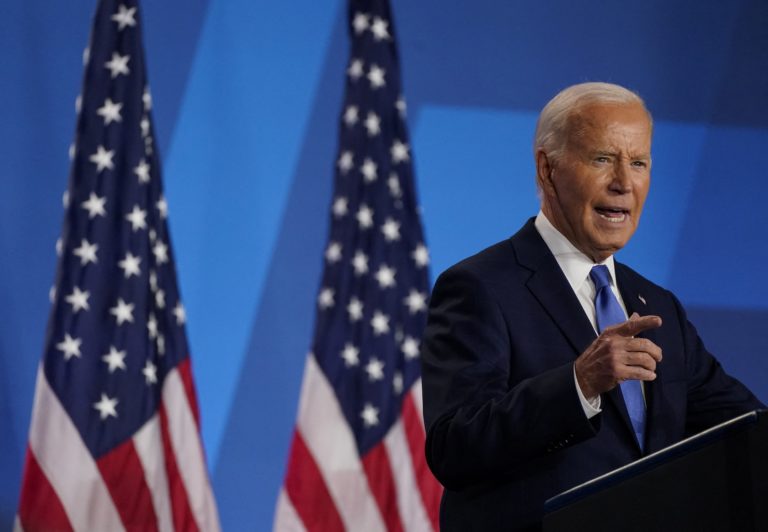Police referred felony murder charges in the case of a Black man who died after being held down by security guards outside a Milwaukee hotel. Video shows four individuals restraining D’Vontaye Mitchell while he was on the concrete and shouting for help. Mitchell was unresponsive when police arrived and was later pronounced dead. Amna Nawaz discussed more with Nayisha Mitchell, D’Vontaye’s sister.
Read the Full Transcript
Notice: Transcripts are machine and human generated and lightly edited for accuracy. They may contain errors.
-
Amna Nawaz:
Police have referred felony murder charges and a case involving a Black man who died last month after being held down by security guards outside a Milwaukee hotel.
According to the city's police department, 43-year-old D'Vontaye Mitchell entered the Hyatt Regency and — quote — "caused a disturbance," ending up in an altercation with security guards as they attempted to detain him.
A warning, this disturbing video was taken by bystanders and shows what happened next. Four individuals restrained Mitchell outside while he was lying prone on the concrete and shouting repeatedly for help. At least one man can be seen with his knee on Mitchell's back. Police say he was unresponsive when they arrived and was later pronounced dead.
This week, his widow, DeAsia Harmon, spoke at a rally outside the county courthouse.
Deasia Harmon, Widow of D'Vontaye Mitchell: To see them beat him repeatedly over and over and over again, they didn't stop. They could have stopped. They could have let him go, and they didn't. To do him like that and to embarrass him like that, to destroy his character, to just take away his dignity, that was so wrong of them to do.
-
Amna Nawaz:
For more now, we are joined by attorney Ben Crump, who's Mitchell family, and by Nayisha Mitchell, who is D'Vontaye's sister.
Welcome to you both.
And, Ms. Mitchell, let me just begin by saying how incredibly sorry we are for you and your family's loss.
I just want to begin by asking, how are you doing?
Nayisha Mitchell, Sister of D'Vontaye Mitchell: Well, first, I want to say thank you for that.
And it's been rough. It's been hard. It's been a long past week-and-a-half since it happened. It's been a lot going on. It's exhausting. My brother's gone. He's no longer here with us. We no longer have him with us, with the family. His kids no longer have their father. My mother no longer has her son.
So it's been rough. It's been hard. And it's going to be some adjustments here for us all. Right now, we're just trying to get through this, this time. And we're going to keep on moving forward. And we're not going to rest. And we're just going to be tired until we get justice here for my brother.
-
Amna Nawaz:
And, Mr. Crump, I understand that you and members of the family have had a chance to review some security camera video from inside the hotel, which is showing you more than has been publicly released so far.
Does any of that offer you any insight into how this incident began in the first place?
-
Benjamin Crump, Mitchell Family Attorney:
Well, it's a heartbreaking video from the security cameras inside the hotel. It starts with him being chased. And he's chased through the hotel.
He runs into the gift shop, and then he runs into the ladies' bathroom. And the two women that were in the bathroom said he wasn't trying to harm them or anything. It was as if he was afraid, he was scared, he was trying to get away from somebody.
We now know that was the security, apparently, that was chasing him. And then they went into the bathroom and they drug him out. And while they were doing so, the video shows him being punched and kicked while he's on the ground, being dragged. And it's just heartbreaking.
They have a metal baton that one of the security guards take out that you see on the bystander video. And he's hitting him. And it looks like he's hitting him in the head.
And you ask yourself, why would you do that? It's just heartbreaking, when you think about George Floyd was in that prone position with knees on his back and on his neck for nine minutes and 29 seconds. Well, D'Vontaye Mitchell was in that prone position for at least eight, we believe as long as 10 minutes, with a knee on his back and at times a knee on his neck.
And you had all the punching and kicking and the baton, which makes his tragic video as outrageous as George Floyd's video.
-
Amna Nawaz:
And, Ms. Mitchell, Mr. Crump has said previously this raises so many questions about the use of force here, and particularly in the case of people who are having a mental health emergency of some kind.
What should we understand about what about your late brother's mental health or his condition at the time?
-
Nayisha Mitchell:
We really don't know what was happening and what was going on at that time, when he was down at the Hyatt.
But what I'm saying here is that, as far as mental issues go, my brother did suffer from having depression. Again, I'm not exactly sure what was happening down at the Hyatt when this all transpired. And if they're saying that he was in there causing a disturbance, that's where I come in and say, maybe he was having a breakdown.
Whatever he was running from, whatever caused this all to happen, we still don't know. We — that's what we're trying to find out. We're trying to find out why he was running. We have learned that he was running from the security guards, but why was he running from the security guards?
But as far as mental health, again, D'Vontaye, for the most part, was suffering from depression.
-
Amna Nawaz:
Mr. Crump, can I just get your reaction to this latest news now?
We know that police have referred felony murder charges to the district attorney. The DA's office says they're investigating Mr. Mitchell's death as a homicide. Is that what you want to see happen at this point?
-
Benjamin Crump:
Well, we want the state attorney to go ahead and bring the charges, but we're grateful that the Milwaukee Police Department did refer murder charges to the state attorney.
But we know this is only the beginning of the journey. We know from history that, until they charge them, until they're convicted, African Americans can never take for granted that we're going to have equal justice play out when there's a dead Black person laying on the ground. We have got too many examples of them doing the bait-and-switch.
So, we have to keep vigilant and keep focused. Before last week, they wasn't even investigating this matter as a criminal investigation. It wasn't until the family and the activists started saying, no, did you all see the video? How can you say that they shouldn't be held accountable for how they killed her brother?
And so it's a first step, but we have to continue to keep pressing forward. Two many examples in the Black community of the police and quasi-police getting away with unjustly killing our children.
-
Amna Nawaz:
To that point, Mr. Crump, I think one of the reasons this video has resonated so deeply is because of how hauntingly similar it is to George Floyd, who I know — his family, I know you represented four years ago.
And I just wonder how it strikes you that you are having to have this conversation again in two such similar cases four years apart?
-
Benjamin Crump:
Yes, obviously, it's very personal, because we watched the George Floyd tragic torture video for 10,000 times.
And now we're having to break this video of the killing of D'Vontaye Mitchell frame by frame. And it does remind you at times of George Floyd and the inhumanity of the situation, a man who's begging to his very last breath, please help me.
And none of them would help him. And so that's what we have to learn, America. How many more times do Black men in prone positions having breathing problems have to plead for their life before America hears them? How many more times?
It was Eric Garner. It was George Floyd. It was Irvo Otieno in Virginia. It was Frank Tyson in Ohio, and now it's D'Vontaye Mitchell. And when you look at all these videos, they are Black men on prone positions with law enforcement on their backs with their knees on them, and all of them died.
How many more?
-
Amna Nawaz:
Attorney Ben Crump and Nayisha Mitchell, sister of the late D'Vontaye Mitchell, thank you so much to you both for joining us.
-
Nayisha Mitchell:
You're welcome.
-
Benjamin Crump:
Thank you.
-
Nayisha Mitchell:
Thanks for having us.






